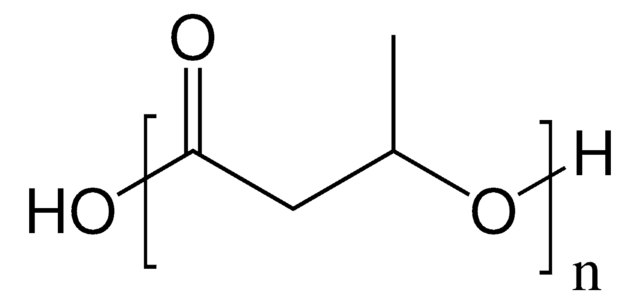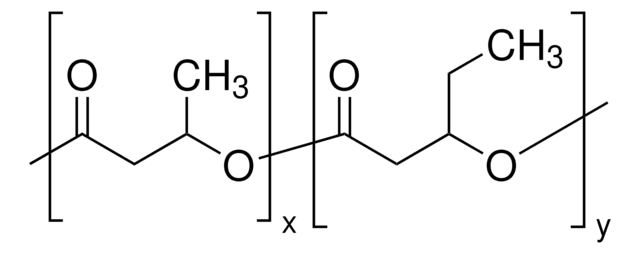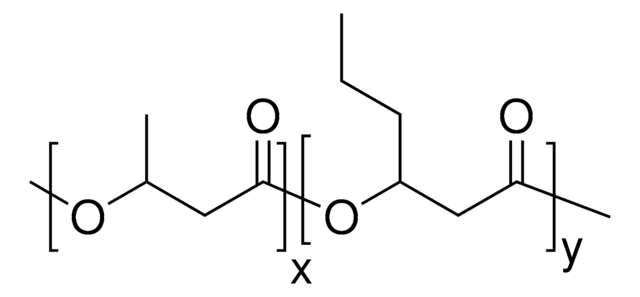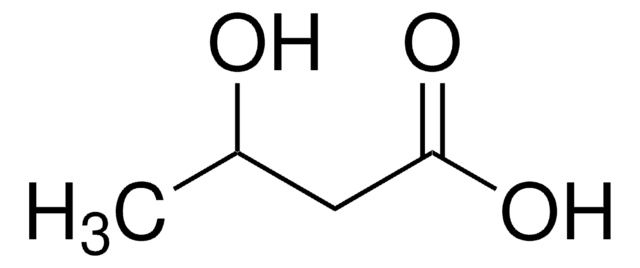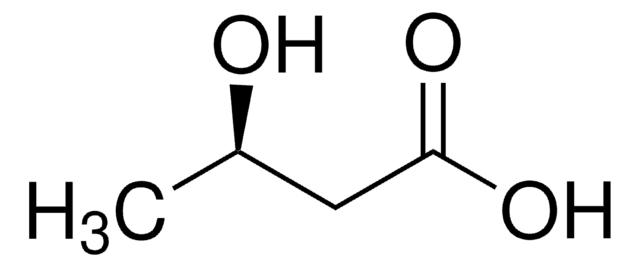363502
Poly[(R)-3-hydroxybutyric acid]
natural origin
Synonyme(s) :
(R)-3-Hydroxybutyric acid polymerized, PHB
Se connecterpour consulter vos tarifs contractuels et ceux de votre entreprise/organisme
About This Item
Formule linéaire :
[COCH2CH(CH3)O]n
Numéro CAS:
Numéro MDL:
Code UNSPSC :
12162002
ID de substance PubChem :
Nomenclature NACRES :
NA.23
Produits recommandés
Niveau de qualité
Température de transition
Tm 172 °C (DSC)
Chaîne SMILES
CC(O)CC(O)=O
InChI
1S/C12H20O6/c1-8(14)6-11(15)18-10(3)7-12(16)17-9(2)4-5-13/h5,8-10,14H,4,6-7H2,1-3H3
Clé InChI
QLACRIKFZRFWRU-UHFFFAOYSA-N
Vous recherchez des produits similaires ? Visite Guide de comparaison des produits
Catégories apparentées
Description générale
Biocompatible, biodegradable polymer.
Application
Poly[(R)-3-hydroxybutyric acid (PHB) is a biodegradable and biocompatible polymer produced by several bacterial species, owing to its low resorbability and tunable properties, it may find uses in a variety of applications such as tissue engineering, controlled release systems etc.
Code de la classe de stockage
11 - Combustible Solids
Classe de danger pour l'eau (WGK)
WGK 3
Point d'éclair (°F)
Not applicable
Point d'éclair (°C)
Not applicable
Faites votre choix parmi les versions les plus récentes :
Déjà en possession de ce produit ?
Retrouvez la documentation relative aux produits que vous avez récemment achetés dans la Bibliothèque de documents.
Proliferation and skeletal myotube formation capability of C2C12 and H9c2 cells on isotropic and anisotropic electrospun nanofibrous PHB scaffolds.
Ricotti L, et al.
Biomedical Materials (Bristol, England), 7(3), 035010-035010 (2012)
Engineering of Saccharomyces cerevisiae for the production of poly-3-d-hydroxybutyrate from xylose.
Sandstrom A G, et al.
AMB Express, 5(1), 14-14 (2015)
Molecular mass of poly [(R)-3-hydroxybutyric acid] produced in a recombinant Escherichia coli.
Kusaka S, et al.
Applied Microbiology and Biotechnology, 47(2), 140-143 (1997)
Rosetta N Reusch
Chemistry & biodiversity, 9(11), 2343-2366 (2012-11-20)
Poly-(R)-3-hydroxybutyrates (PHB), linear polymers of (R)-3-hydroxybutyrate, are components of all biological cells in which short polymers (<200 monomer residues) are covalently attached to certain proteins and/or noncovalently associated with polyphosphates - inorganic polyphosphate (polyP), RNA, and DNA. The low concentrations
Asli S Ciggin et al.
Bioresource technology, 129, 118-126 (2012-12-13)
The aerobic metabolism of a mixture of acetate and starch was studied with main emphasis on their interaction and the effect on their storage as PHB and glycogen, respectively. Pulse feeding strongly increased the storage of both substrates; however, the
Notre équipe de scientifiques dispose d'une expérience dans tous les secteurs de la recherche, notamment en sciences de la vie, science des matériaux, synthèse chimique, chromatographie, analyse et dans de nombreux autres domaines..
Contacter notre Service technique